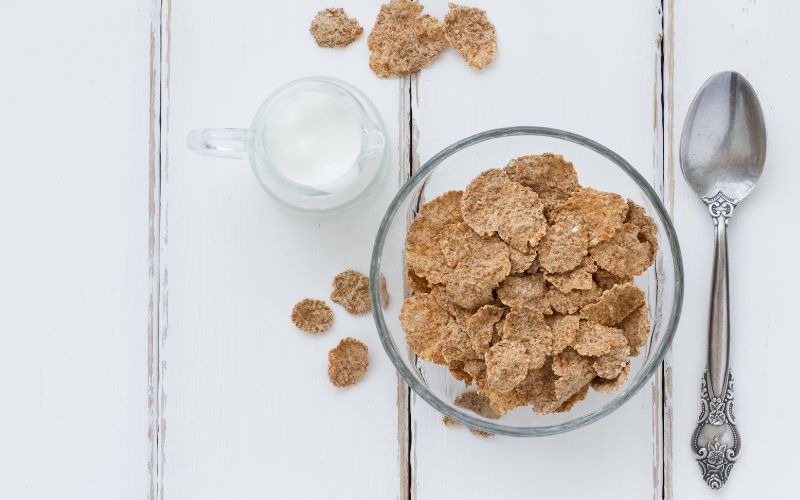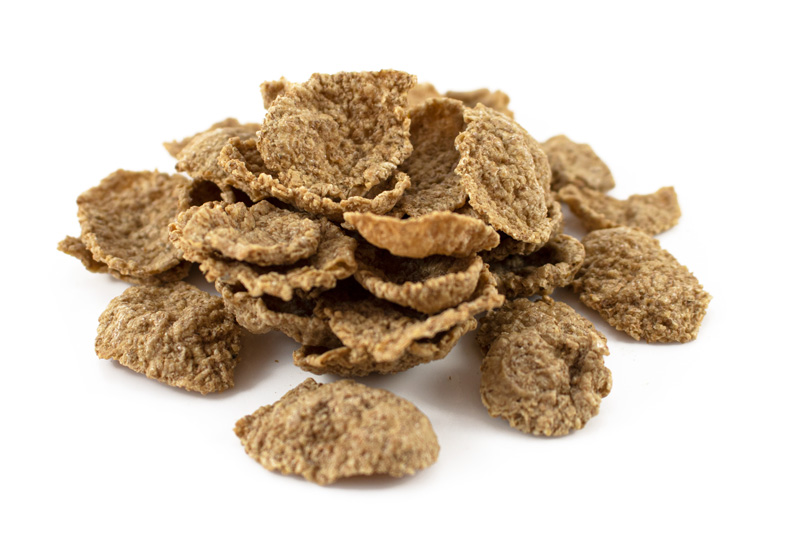Provided that they are served in moderation, bran flakes are perfectly safe for dogs to eat. Serve them to your dog in small amounts, softened with warm water and without sugar or other sweeteners. Bran flakes will increase the amount of calories that your dog eats, so reduce his other food levels to stop him getting fat.
What are bran flakes?
Bran flakes are simply small pieces of toasted cereals and contain quantities of wheat and oats.
They are usually eaten with milk, either warm or cold and, from a human perspective, are somewhat tasteless.
Can Dogs Eat Bran Flakes?
This podcast discusses whether dogs can eat bran flakes. It advises that plain, unsweetened bran flakes are safe for dogs in moderation, but cautions against using milk to soften them. The episode also covers potential health benefits like fibre and mineral content, while highlighting the importance of consulting a vet before introducing bran flakes into a dog’s diet. Appropriate portion control and avoiding added sugars or sweeteners are emphasized, concluding that while bran flakes can be an occasional safe treat, a balanced diet of dog food and treats is more suitable for canine health.
Are bran flakes good for dogs?
Dogs can eat many human foods and bran flakes are one example of a food that is safe and good for dogs.
They are a good and natural source of fibre and, as a wholegrain cereal, can benefit heart and digestive health.
To give your dog the best health benefit you should never add sugar or any other sweeteners to bran flakes and always make them soft by adding warm water.
Health benefits of feeding bran flakes to dogs
As a wholegrain source of fibre, bran flakes have many nutritional qualities which include:
In a 30g serving:-
- Energy – 425KJ
- Fat – 0.7 g
- Saturates – 0.1 g
- Sugars – 6.3 g
- Salt – 0.27 g
Bran flakes also contain a significant amount of zinc, copper and other vitamins and minerals which can help your dog to maintain and develop a healthy lifestyle.
How many bran flakes can I feed to my dog?
You should always introduce new foods to your dog’s diet carefully and slowly to watch for any problems and to minimise any risk to your dog.
The amount of bran that you feed will depend upon the size and weight of your dog and for a dog that weighs 10lb a good portion size is around one half of a tablespoon.
For larger dogs you can increase this amount, but remember to start with small sizes and, if your dog shows any sign of discomfort or has diarrhea then you should stop feeding and consider an alternative source of fibre.

How to feed bran flakes to dogs
Bran flakes are a really easy food to give to your dog and provided you serve them carefully then you should not see any issues or problems.
Always soften bran flakes with warm water and make sure that they are cool before serving.
Serve a small amount and keep an eye on your dog to make sure that he is okay with the food.
Only use plain and unsweetened bran flakes and never feed any that have added fruits, sugar or sweeteners or syrups.
There are some fruits and sweeteners that are dangerous for dogs and some cereals can contain these.
You can mix bran flakes into your dog’s regular meals but make sure that you don’t feed him too much food to prevent him from putting on weight.
Risks of feeding bran flakes to dogs
There are very few risks associated with feeding bran flakes to dogs. The main things to remember are to:
Do
Don’t
Can I give my dog bran flakes for constipation?
While bran flakes might be considered as a potential fibre source to help alleviate constipation in dogs, it’s crucial to approach the matter with caution and consult a veterinarian before making any dietary changes.
Dogs have different digestive systems and dietary requirements compared to humans, and what works for us might not necessarily be suitable for them.
If your dog is experiencing constipation, here are a few general tips, but remember to always consult with a vet first:
Hydration: Ensure your dog has access to plenty of fresh water.
Exercise: Regular physical activity can help stimulate bowel movements.
Diet: Sometimes, a diet that’s higher in fibre might be recommended. Pumpkin is a commonly suggested food for adding fibre to a dog’s diet in a gentle way.
If you’re considering using bran flakes:
Sugar and Additives: Ensure that the bran flakes do not contain harmful additives, high levels of sugar, or artificial sweeteners, which can be harmful to dogs.
Portion Size: If your vet approves the use of bran flakes, ensure that you’re providing an appropriate portion size for your dog’s weight and dietary needs.
Gradual Introduction: Introduce any new food into your dog’s diet gradually to avoid upsetting their stomach.
Monitor: Keep a close eye on your dog for any signs of distress, discomfort, or further digestive issues and contact your vet immediately if you notice anything concerning.
Remember, always prioritise professional advice from a veterinarian when it comes to your pet’s health and wellbeing.
Can dogs eat bran flakes?
Yes they can. They are a good and natural source of fibre and other dietary supplements that can help your dog to maintain his health and condition.
If fed carefully and introduced slowly then your dog will benefit from this natural source of fibre.
IMPORTANT CONSIDERATIONS WHEN GIVING BRAN FLAKES TO DOGS
When considering whether dogs can eat bran flakes, it’s vital to take into account several factors to ensure their safety and wellbeing.
Here’s a list of important considerations:
- Nutritional Requirements
Species-Appropriate Diet: Dogs have specific nutritional needs that may not be met with human foods like bran flakes. - Ingredients and Additives
Sugar Content: Many bran flakes contain added sugar, which is not healthy for dogs.
Artificial Sweeteners: Some bran flakes might contain artificial sweeteners, like xylitol, which is toxic to dogs.
Additives: Ensure no harmful additives or ingredients are present. - Dietary Tolerance
Allergies or Sensitivities: Be aware of any potential allergies or food sensitivities your dog may have.
Digestive Health: Consider how introducing a new food might impact your dog’s digestive system. - Veterinary Advice
Professional Input: Always consult a vet before introducing new foods into your dog’s diet, especially for medicinal purposes like alleviating constipation. - Portion Control
Appropriate Quantities: If bran flakes are deemed safe by a vet, ensure they are given in moderation and not as a meal replacement. - Alternative Solutions
Safer Options: There may be safer, more effective options for increasing fibre in your dog’s diet, such as pumpkin or specific high-fibre dog foods. - Monitoring
Observe for Changes: Watch for any changes in your dog’s behaviour, digestion, or stool after introducing new foods.
Immediate Response: Be prepared to contact your vet and respond accordingly if your dog shows signs of distress or illness. - Long-Term Health
Balanced Diet: Ensure that any additions to your dog’s diet do not disrupt their overall nutritional balance.
Weight Management: Be mindful of the calorie content in bran flakes and how it fits into your dog’s daily intake. - Purpose of Feeding
Addressing Constipation: If using bran flakes to address constipation, ensure this is a vet-approved method and that you understand the underlying cause of the constipation. - Preparation Method
No Additions: If bran flakes are given, ensure they are plain and not served with milk or other additives. - Safety First
Choking Hazard: Ensure that the food is presented in a way that minimises the risk of choking or other hazards.
FAQS
What are the health benefits of feeding bran flakes to dogs?
Feeding bran flakes to dogs can provide dietary fibre, aid in digestion, and promote bowel regularity.
Can bran flakes help with a dog’s weight management?
Yes, bran flakes can contribute to weight management in dogs by providing a low-calorie and high-fibre option that promotes a feeling of fullness.
Are there any additional health benefits of bran flakes for dogs?
Yes, bran flakes can also assist in reducing the risk of certain gastrointestinal issues and may help control blood sugar levels in diabetic dogs due to their high fibre content.
Are bran flakes good for dogs with diarrhoea?
Bran flakes may be suitable for some dogs with diarrhoea, but it’s essential to exercise caution and consult with your veterinarian before adding any new food to your dog’s diet, especially if your dog is experiencing digestive issues.
Bran flakes are a source of dietary fibre, which can sometimes help firm up loose stools in dogs. However, introducing new foods to a dog’s diet can be tricky, and not all dogs will tolerate bran flakes well.
Final Words
It won’t do your dog any harm to have the occasional treat of bran flakes but they are not really aimed at the doggy digestive system.
If you are having a bowl and want to share then maybe you can let your pet have a few but, truthfully, you should feed your dog proper dog treats and food, to ensure that he remains fit and healthy.
As with all things relating to your pet, if you have any concerns, then always talk to your vet who can provide the most appropriate advice for your dog.




